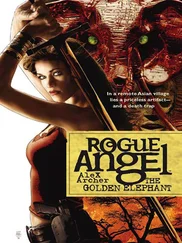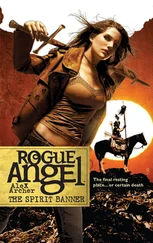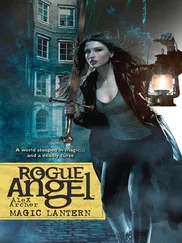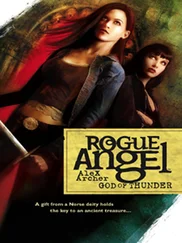“I’m afraid I’m not going to be around long enough to take in a show.”
“Ah, that’s a shame.”
The girl smiled and started back toward the door, balancing a tray of dirty cups.
“I know this might seem like a stupid question,” Annja said. “But I don’t suppose you know where the Convent of San Francisco used to be?”
The girl shrugged. “Sorry. Was it around here?”
“I was really hoping so, but I can’t see anything to even suggest where it might have been.”
“Well, it depends how old it is. Most of the buildings around the plaza were built in the 1800s, I think, and some of it is more modern than that. A lot of the old buildings that were here before that were demolished to make way for the new. There’s some kind of plaque on the theater—one of those historic-landmark things—but I can’t remember what it says. Sorry.”
“That’s okay. Thanks, anyway,” Annja said. “I’ll go take a look.”
The theater was closed, its front doors locked and everything inside dark. Even the box office. The plaque was on the wall beside the main door. It detailed how the Zorrilla had been built on the original site of the Convent of San Francisco.
A dead end, Annja thought miserably, realizing how much time she’d wasted only to reach a standstill.
She was already three hours down and all she had to show for it was a burlesque theater built on the site of an old convent. That wasn’t going to help Garin.
Or was it?
That very much depended upon what had happened to the convent and whether the theater had been constructed in its place or on top of its partial remains. She’d seen enough buildings that had been built directly on top of previous ones to know that there was a chance the foundations and any lower levels might—just might—have survived beneath the new one. There was an entire city beneath Chicago, for instance, not that you could access it. Annja had no guarantee that there was anything of the convent left, not even a few broken stones. There was a chance, though, and in the absence of any other leads, she was going to take it and hope the old builders had simply chosen to bury the convent, or the cellars and mausoleum level at least, rather than waste time and resources demolishing it. Hell, it was even possible the lower levels had been used in the construction of the theater’s foundations, but she doubted she’d be that lucky. Given the way her day had been going thus far, the place had probably burned to the ground.
Hammering on the front door brought no response.
She headed around the side of the building in search of the stage door, hoping there’d be someone inside the building who’d let her in, assuming she could make herself understood—though how convincing her Spanish would be was anyone’s guess.
Unsurprisingly, though, the side door was locked, as were some larger doors at the rear where stage equipment was likely delivered.
Having exhausted her options at ground level, Annja looked up. There was a small window ajar more than twenty feet above her, so she couldn’t simply make a jump for it, but there was an inviting drainpipe that would take her up to a ledge from which she could probably reach it. The drainpipe flaked paint and rust when she tested it, but she thought it might just hold her weight. She glanced back down the alleyway and into the plaza to be sure no one was watching her, then she shimmied up the pipe. A small boy turned in her direction, an ice cream in one hand, his mother holding the other one. He gave her a white-smeared smile and then disappeared, dragged out of sight by Mom.
Annja hauled herself up, finding her first foothold in the grouting as she scrambled upward. Less than thirty seconds later, she was inching along the ledge. She pressed up against the glass and reached inside to open the window wide enough to flop inside.
She found herself in a janitor’s cupboard, full to overflowing with the clutter of cleaning supplies—buckets, brushes and disinfectants all promising the reek of summer forests and autumn meadows, and enough toilet rolls to keep a small army clean and fresh. Annja managed to negotiate the obstacle course without sending the precarious piles of chemicals and cleaning fluids sprawling. The door opened—mercifully, it wasn’t locked—to reveal a heavily carpeted hallway. The carpet was one of those old red faux-Chinese patterns that cinemas and theaters around the world loved so much in the seventies. She wasn’t going to find anything ancient on this floor, so her first job was to locate the stairs. She followed a sign for the emergency exit, figuring it would offer the most direct route down. The stairwell was undecorated, showing the weeping brickwork of the old theater. It opened up onto the front of the auditorium, stage left.
The auditorium was in near-absolute darkness; only a strip of low-level security lights was on, giving enough of a glow for Annja to approach the stage without falling over.
She was certain there would be a space beneath the stage, and with luck, that would lead into the bowels of the theater, where she’d find the remains of the previous building...if they even existed. The curtain was down, so thick it gave no hint of the burlesque backdrop it hid.
A door with a glowing sign displaying the word Salida took her in the right direction.
Another door led her to the backstage area, where a flight of wooden stairs led down into the darkness below.
No one challenged her as she moved through the old theater.
She’d been reluctant to turn on additional lights in case they alerted anyone connected to the theater, inside or out, but once she started descending she had no such reservations about turning on the first light she found.
Annja detected the faintest odor of damp as she reached the bottom of the staircase.
The glow of the strip lighting failed to illuminate much beyond the stairs, but she saw a flashlight standing upright on a small desk close by. It didn’t take long to sweep the entire area with the beam. She made her way back among the scenery boards, playing the flashlight beam between them, searching for a sign, anything, that hinted at another way down, deeper. Cobwebs clawed at her face as she made her way into the gloom. Annja peered behind stacked boards, moving them so she could see behind them properly.
The shadows gathered around her feet masked the step. Her heel caught, but she stopped herself before she went sprawling to the ground. She took more care as she moved on. There was another step only a few feet away. And another beyond that, turning slightly. She followed the spiraling steps, descending into a space below the theater’s storeroom.
Her heart raced as she realized this space was much older than the Zorrilla itself—which had to be a good thing. Surely that meant the theater had been built on top of the old convent, didn’t it? The room before her extended far beyond the walls of the theater. Annja tried to orient herself with the world above. As best she could tell, the vast chamber seemed to lead away from the plaza, running beneath other buildings that now occupied the land where the convent had once stood. Meaning she was standing in whatever remained of the ancient building.
Playing the light around the room, she spotted a passage. It was the only one. She followed it, but before she had moved too far along it, her way was blocked by a stone wall with a stout iron-banded wooden door set into it. A heavy iron ring hung as a handle.
She pushed against the door. It didn’t give.
Locked, or bolted from the other side? She put her shoulder against it and pushed again, harder this time. The door gave a little, the creak echoing through the low-ceilinged passage to the cavernous room behind her.
Читать дальше












